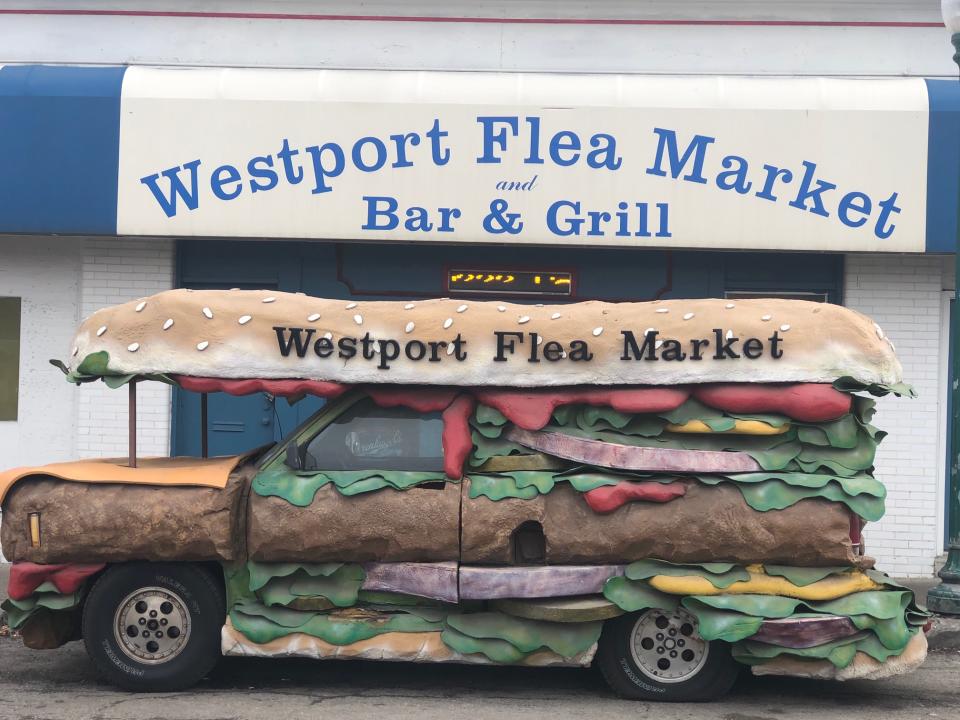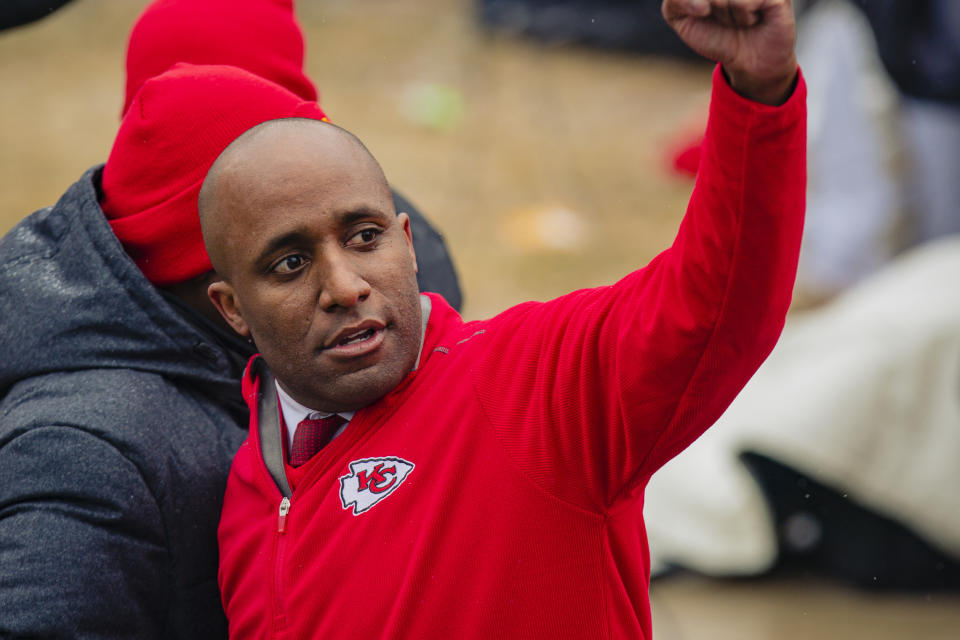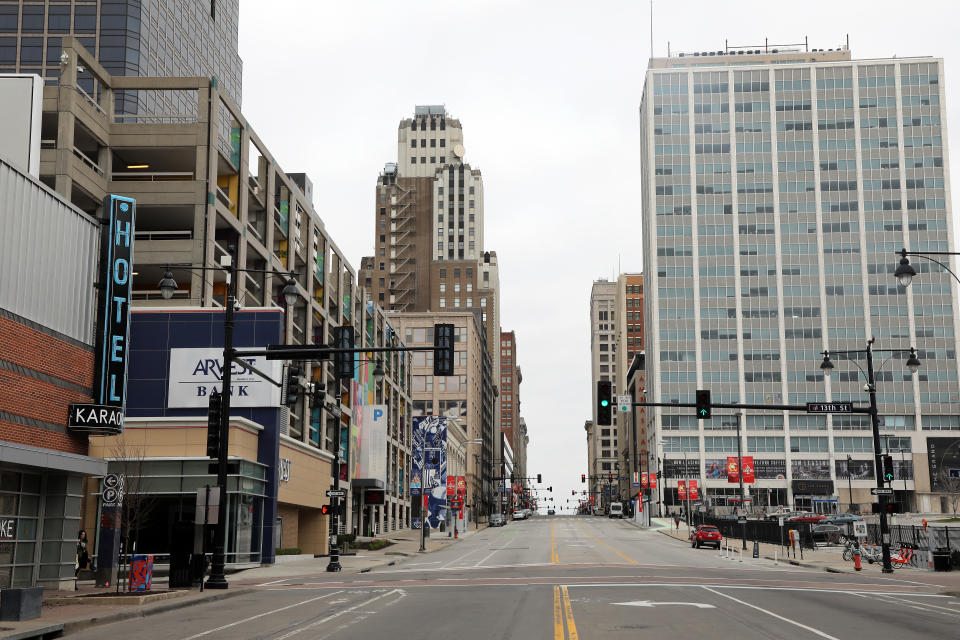Coronavirus hasn’t ravaged America's heartland yet, and one of its biggest cities is trying to keep it that way
KANSAS CITY, Mo. — For a day that he won’t forget anytime soon, Joe Zwillenberg remembers March 16, 2020, starting out decently.
It was a Monday, and Zwillenberg, a restaurateur who owns the Westport Flea Market, a Kansas City staple that doubles as one of the city’s most popular burger joints, was coming off a strong sales weekend with the promise of more to come. St. Patrick’s Day was only a day away, and Zwillenberg typically cleans up every March 17.
“Man, that’s Christmas, Hanukkah and Kwanzaa all rolled up into one,” Zwillenberg said with a hearty laugh. “St. Patrick’s Day was my bonus!”
Just like he has every year of the 14 he has owned the restaurant, Zwillenberg had a hundred cases of beer stocked up and ready to go. His employees, many of whom have worked for him for over a decade, were excited and primed for monster tips. It was all set up.
There was just one problem: The most dangerous global pandemic in a century was setting in.

Kansas City is nestled in the middle of America and thus believed by some residents to be insulated from the spread of the coronavirus. Officials saw otherwise and took action.
If it wasn’t apparent the week before, when the Big 12 cancelled its men’s and women’s basketball tournaments, institutions in Kansas City, it became painfully clear to residents that Monday evening, when mayor Quinton Lucas announced a sweeping closure of schools and movie theaters, a ban of public gatherings of 10-plus people and the prohibition of restaurants offering dine-in service.
It was a tough blow to restaurateurs like Zwillenberg, who had to close his business on St. Patrick’s Day, and one that exemplified why more than half of the 350 small, medium and large businesses who recently responded to a Greater Kansas City Chamber of Commerce survey admitted they expect to struggle financially due to the COVID-19 pandemic.
“It was brutal,” Zwillenberg said. “That Monday the 16th was really, really … everybody got real serious and started staying home. And I don’t blame them.”
Customers have mostly stayed home since then, all with a push from their local government. Those measures have not come without consternation or consequences, and it remains to be seen how effective those measures will be.
Tough but necessary coronavirus decisions

Lucas followed up the restrictions with a one-month stay-at-home order that started the following week, requiring Kansas City residents to stay at home except for “essential” activities like grocery shopping and trips to the doctor or pharmacies. Restaurants could still be visited, but for only takeout.
After Lucas’ order, residents began crowding stores, grabbing toilet paper, milk, bread, eggs and disinfectant wipes. In a suburb north of the city, a policeman even stood outside of a popular grocery store to keep order.
While “essential” businesses have thrived, the measures were a significant blow to non-essential businesses and the tax revenues of a city that needs that money.
And considering the number of COVID-19 cases in Missouri is relatively small compared to other states — nearly 1,100 confirmed cases and at least 13 deaths as of Monday, compared to over 67,000 confirmed cases and at least 1,200 deaths in New York — Lucas’ decisions were decidedly proactive, especially since Missouri has not issued a statewide stay-at-home order yet.
“We were pretty out there early when we issued our ban on large events, and I think I just trusted what we were seeing in medical experts,” Lucas told Yahoo Sports shortly after the order took effect. “Folks were saying first of all, we don’t have a cure, and second, I have a significant fear ... not that it will just spread here, but where it will spread and what populations it will spread [in].”
Those populations include the homeless and those with low incomes.
“Something I know ... if we’re not equipped for something, we are really not equipped for something if it starts impacting the poorest in our community,” said Lucas, 35, who grew up in Kansas City. “This just can’t be a thing where we have a number of cases and hope that private insurance can help out people who have doctors and all of that, because I’m scared of what happens when it hits the hundreds of people who can’t afford it, the hundreds of people who are immunocompromised but don’t have regular physicians.”
Preventing the spread of the coronavirus is key, Lucas noted. If too many people get infected at the same time, local hospitals will be overrun and more people will die — hence the need to flatten the curve.
That’s why banning large public gatherings is so critical. Lucas himself attended one less than two months ago: the Chiefs’ Super Bowl parade.
“Look, I’m in politics — the number of hands that I’ve shaken over the last month even, I mean, it’s amazing,” Lucas said. “... It’s why we have to do things like shut down tournaments, why we have to do things like frankly shut down the commerce of a region. Nobody likes to do it, nobody likes losing the tax revenues, but frankly, here we are, and this is what we’ve got to do to make sure we get through the moment.”

Lucas readily admits that moment doesn’t have a timeline, though he remains hopeful for a quick resolution.
“I hear the doomsday scenarios like a lot of people that say in three or four months, we’ll still be in this panic or whatever,” Lucas said. “I don’t think we can sustain that. I hope the tough choices we’re making now allow us to look at the end of April and say, ‘Alright, we’ve at least flattened the curve, we’ve come up with a way that we can better handle this crisis and we’re ready to move back to the lives that we knew.’ I actually think, frankly, that the American people will only take so long of a lot of the harsh restrictions.”
There are already signs of defiance in his own city, it turns out.
Further coronavirus measures are needed
On Monday, Lucas revealed in a news conference that the city is citing 200 businesses for not following the order. Violators can be charged with misdemeanors and receive a fine of up to $500 and up to six months in jail.
Lucas also noted that a few of the city’s parks were packed over the weekend, with kids playing on basketball courts and using playground equipment. Social distancing, this was not.
“It disappoints me when, this weekend, I was in Swope Park and saw that there were probably 50 kids around a basketball game — the kids that are playing and then the folks that are standing around,” Lucas said. “And I understand it’s warm outside, these are things people want to do, but there’s a reason we’re going through these steps to keep these kids safe, their parents, grandparents and so many others safe.”
When asked if his measures were Orwellian, Lucas noted that other cities have taken more extreme steps. He also reiterated that the order was given, in large part, to prevent the type of spread that has affected New Orleans, whose metro area is smaller than Kansas City’s but already has thousands of confirmed cases overloading its health care system and basic services.
To further the prevention effort, Lucas announced Monday that Kansas City will put up caution tape on a few playgrounds and increase police patrols in parks. He also encouraged people to call police if they know of anyone throwing large house parties involving more than 10 people.
“Everybody has responsibility in the city to be helping us with this because we’re damaging some businesses through this action right now,” said Dr. Rex Archer, Kansas City’s director of public health. “If people don’t comply on the voluntary side, then we can’t remove this as soon as we’d like to.”
There have been some positive developments, Archer said. He hasn’t seen anyone shake hands in over a week. But he also stressed the continued importance of non-violent self-enforcement of social distancing.
“It’s the same thing with smoking — people self-enforce that,” Archer said. “We don’t have to tell people in these various places; people look at each other and self-enforce. We’re asking [for] peer pressure … to ask people to be practicing these social distancing components.”
The calm before the coronavirus storm?
Dr. Erica Carney, Kansas City’s emergency medical services director, said Monday that there is a shortage of testing in Kansas City, just like there is almost everywhere else in America. That means it’s impossible to know how successful the city has been at flattening the curve.
“In hospitals across the board, the census has been low — which means people have been listening to the mayor and health director’s statement to only go into the emergency department if you become extremely ill,” Carney said. “That being said, we all feel on the healthcare side this is potentially the calm before the storm.
“We know that whenever we get the test results back — they’re already a couple of days behind just because it takes time to get the test results back — I can tell you anecdotally, after working in the COVID pod, it is here and there are patients who are sick with this.”

The local businesses affected by the stay-at-home order can only hope for the best. Help is on the way for many of them; Kansas City just passed a $500,000 small business relief fund, and the newly passed federal stimulus package allocates $350 billion in loans to small businesses with low interest rates.
The pandemic is still causing an unprecedented interruption in everyday business for people like Zwillenberg. In the meantime, he insists he has enough money to pay all his employees for several months.
“I’ve been saving for a rainy day, and it’s raining,” Zwillenberg said. “I’m not gonna get paid, but that’s OK. I’ve made money and I’ve been successful for 20-plus years.
“Obviously, it would be great if I was having a great second quarter and we were just crushing it, but that’s just not possible.”
Zwillenberg remains hopeful. With his restaurant operating in a limited capacity over the weekend, he says business was actually solid considering the circumstances — his “buy a burger, get a free beer” promotion apparently went over well.
To him, it offered hope that Americans’ craving for the things they love will only grow stronger in these uncertain times.
“I’m gonna do this, we’ll be open again and rolling again,” Zwillenberg said. “It will all be OK.”
More from Yahoo Sports:

